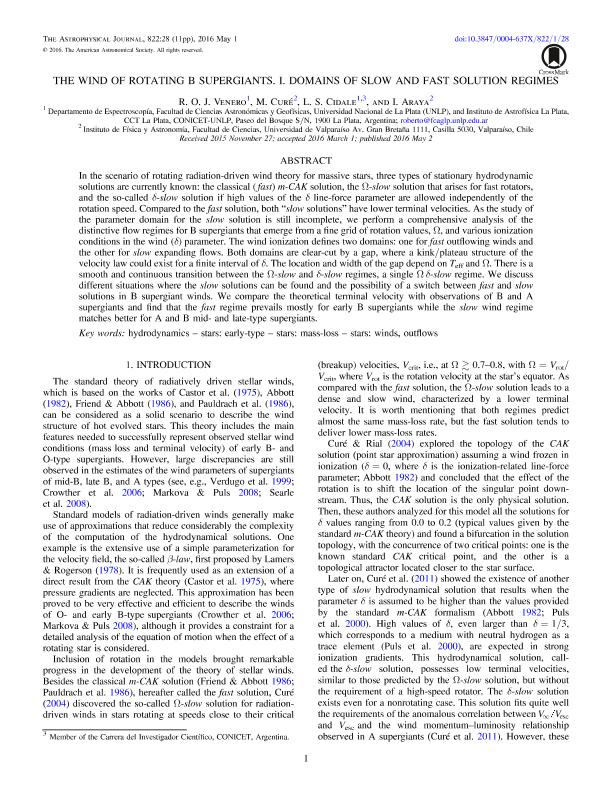Mostrar el registro sencillo del ítem
dc.contributor.author
Venero, Roberto Oscar José

dc.contributor.author
Curé, M.
dc.contributor.author
Cidale, Lydia Sonia

dc.contributor.author
Araya, I.
dc.date.available
2018-02-14T16:34:09Z
dc.date.issued
2016-05
dc.identifier.citation
Venero, Roberto Oscar José; Curé, M.; Cidale, Lydia Sonia; Araya, I.; The wind of rotating B supergiants, I : domains of slow and fast solution regimes; IOP Publishing; Astrophysical Journal; 822; 28; 5-2016; 1-11
dc.identifier.issn
0004-637X
dc.identifier.uri
http://hdl.handle.net/11336/36434
dc.description.abstract
In the scenario of rotating radiation-driven wind theory for massive stars, three types of stationary hydrodynamic solutions are currently known: the classical ( fast) m-CAK solution, the Ω-slow solution that arises for fast rotators, and the so-called δ-slow solution if high values of the δ line-force parameter are allowed independently of the rotation speed. Compared to the fast solution, both ?slow solutions? have lower terminal velocities. As the study ofthe parameter domain for the slow solution is still incomplete, we perform a comprehensive analysis of the distinctive flow regimes for B supergiants that emerge from a fine grid of rotation values, Ω, and various ionizationconditions in the wind (δ) parameter. The wind ionization defines two domains: one for fast outflowing winds and the other for slow expanding flows. Both domains are clear-cut by a gap, where a kink/plateau structure of thevelocity law could exist for a finite interval of δ. The location and width of the gap depend on Teff and Ω. There is a smooth and continuous transition between the Ω-slow and δ-slow regimes, a single Ω δ-slow regime. We discussdifferent situations where the slow solutions can be found and the possibility of a switch between fast and slow solutions in B supergiant winds. We compare the theoretical terminal velocity with observations of B and Asupergiants and find that the fast regime prevails mostly for early B supergiants while the slow wind regime matches better for A and B mid- and late-type supergiants.
dc.format
application/pdf
dc.language.iso
eng
dc.publisher
IOP Publishing

dc.rights
info:eu-repo/semantics/openAccess
dc.rights.uri
https://creativecommons.org/licenses/by-nc-sa/2.5/ar/
dc.subject
Hydrodynamics
dc.subject
Early Type Stars
dc.subject
Mass Loss
dc.subject
Winds
dc.subject
Outflows
dc.subject
Stars: Early-Type
dc.subject
Stars: Mass-Loss
dc.subject.classification
Astronomía

dc.subject.classification
Ciencias Físicas

dc.subject.classification
CIENCIAS NATURALES Y EXACTAS

dc.subject.classification
Astronomía

dc.subject.classification
Ciencias Físicas

dc.subject.classification
CIENCIAS NATURALES Y EXACTAS

dc.title
The wind of rotating B supergiants, I : domains of slow and fast solution regimes
dc.type
info:eu-repo/semantics/article
dc.type
info:ar-repo/semantics/artículo
dc.type
info:eu-repo/semantics/publishedVersion
dc.date.updated
2018-02-07T17:03:16Z
dc.journal.volume
822
dc.journal.number
28
dc.journal.pagination
1-11
dc.journal.pais
Estados Unidos

dc.journal.ciudad
Londres
dc.description.fil
Fil: Venero, Roberto Oscar José. Universidad Nacional de la Plata. Facultad de Ciencias Astronómicas y Geofísicas; Argentina
dc.description.fil
Fil: Curé, M.. Universidad de Valparaíso; Chile
dc.description.fil
Fil: Cidale, Lydia Sonia. Universidad Nacional de la Plata. Facultad de Ciencias Astronómicas y Geofísicas; Argentina
dc.description.fil
Fil: Araya, I.. Universidad de Valparaíso; Chile
dc.journal.title
Astrophysical Journal

dc.relation.alternativeid
info:eu-repo/semantics/altIdentifier/url/http://iopscience.iop.org/article/10.3847/0004-637X/822/1/28/pdf
dc.relation.alternativeid
info:eu-repo/semantics/altIdentifier/doi/http://dx.doi.org/10.3847/0004-637X/822/1/28
Archivos asociados
